Study about the Impact of COVID-19 on Global Tourism Distribution.
Study about the Impact of COVID-19 on Global Tourism Distribution.

Effective Communication: From the Crisis to the New Normal
04/06/2020
Agents and tour operators expect the recovery of European tourism to begin in the first half of 2021.
22/09/2020Study about the Impact of COVID-19 on Global Tourism Distribution.
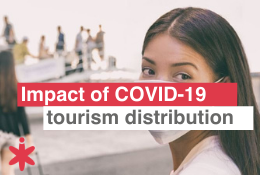
The Spanish intermediation innovates in product and management to face a scenario of uncertainty.
According to a worldwide survey conducted by Interface Tourism Spain, in collaboration with its global network Travel Consul, the tourism distribution in Spain considers its survival threatened in the short and medium term if current circumstances do not change, but the sector is focused on readjusting its business and looking for new models and products to face the recovery in the best conditions. Intermediation in Spain has dealt with challenges and opportunities similar to those found by its colleagues in other international markets.
Although Spanish tour operators and agents see the survival of their companies threatened in the short and medium term by the effect of the COVID-19 pandemic, during the most critical phase, companies in the sector have sought various formulas and business models to ensure viability and prepare for recovery, with innovation in destinations, products, markets and technology. This is the main conclusion of a study carried out by Interface Tourism Spain, in collaboration with its global network Travel Consul, in 30 markets worldwide, including Spain.
The “Study on the Impact of COVID-19 on Global Tourism Distribution” was conducted between May 11 and 25 of this year, through a survey sent to 900 Tour Operators and Travel Agents worldwide. It aims to examine the keys impacts of the COVID-19 pandemic on the tourism industry and to analyse the factors that will contribute to its recovery.
The results of the report reveal that this crisis has affected Spanish intermediation in various ways. According to the survey data, 38% of the companies in the sector went on to work part-time and one in four had to lay off almost all their staff; while a third of them sought other formulas, such as ERTEs or closing down their businesses temporarily. In this sense, most agents and tour operators for the most part have opted for strategies such as adjusting their business model, designing new tourism products and investing in technology to improve their offer and customer management to ensure their viability and survival. These measures were intended to alleviate the effects of the paralysis of the tourism business and to prepare the business structures for decreases in income which, for the vast majority of respondents, will be concentrated in the third quarter of this year.
Furthermore, many professionals in the sector perceive that, in the current conditions and with limited help from the authorities, their businesses will not be able to survive in the short (one to three months, for 50% of respondents) or medium term (four to six months, for 28% of respondents). The uncertainty is clear: in fact, 53% do not have a clear forecast as to when the volume of activity will return to a level similar to that before the crisis, and 43% expect recovery to occur in 2021.
More flexibility, technology and customer service channels
Delving into the crisis generated by the pandemic and its effect on bookings, the Spanish intermediaries acknowledge that the vast majority of their clients cancelled their bookings or postponed them until next year, and only a minority decided to postpone their trips during this year. The management and attention of the clients was carried out mainly by email and telephone, through video conference systems, and also, in a more residual way, in live chats or social networks. Sectoral networks have been important in keeping Spanish intermediaries updated on the particulars of the pandemic, as sectoral associations have been the main source of information for agents and tour operators, followed by tourism offices, and the national government.
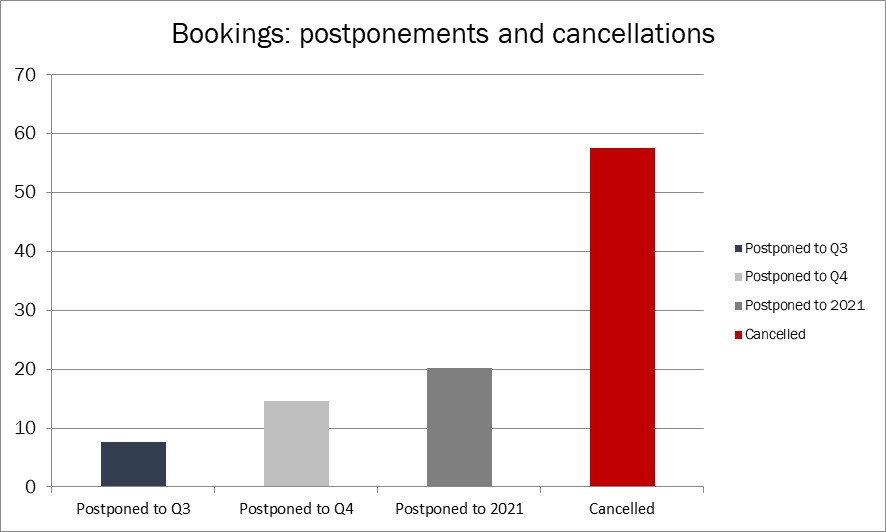
During the confinement, the Spanish Tour Operators and Travel Agents took advantage of the training opportunities offered by the destinations, and considered that the tourism offices could implement measures that would contribute to the recovery, such as certifying agents in health and safety matters, sharing official updates for the press and for agents about the destination, continuing with actions such as training or webinars, creating relevant information platforms for the sector and carrying out consumer marketing campaigns.
With regard to future prospects, Spanish intermediaries say that 57% of travellers will wait to choose a destination, 27% will travel to the place they had already planned before the pandemic, and 16% will change destination.
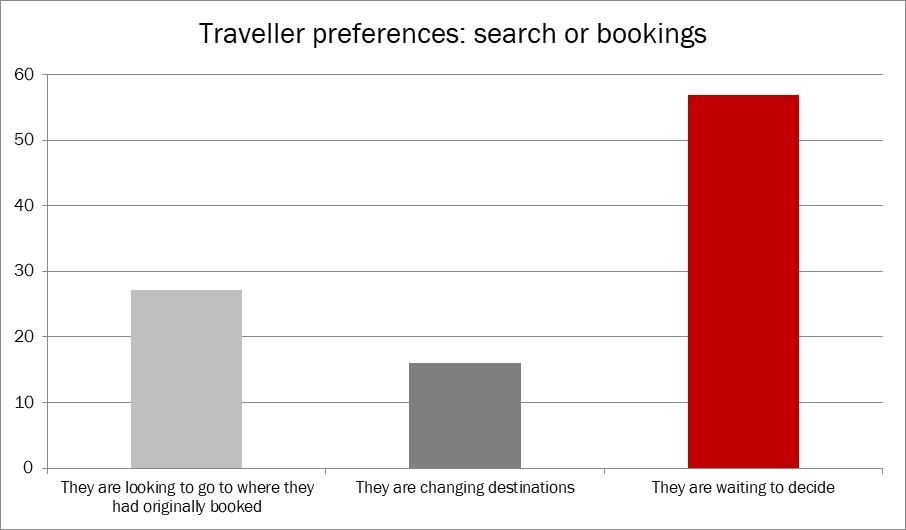
The experience gained during the most critical phase of the crisis will drive changes in business practices in the Tour Operator and among travel agents: communication channels with customers will be enhanced, policies on changes and cancellations will be modified and new commercial agreements will be promoted.
In addition, respondents say they will do more digital and social media campaigns and more diversification of source markets, products and destinations; in fact, the vast majority of survey participants say they will work with destinations and suppliers that were not in their portfolio before.
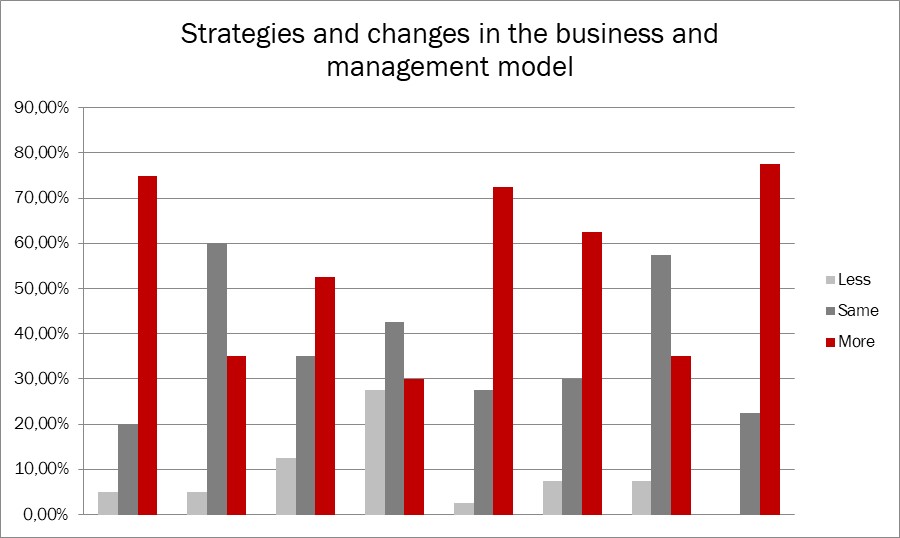
Variety and new strategies: keys to global distribution after the pandemic
The results of the survey in the international markets analysed do not differ much from the Spanish diagnosis, although there are notable differences. For example, unlike Spain, 40% of travellers want to travel to the destination they had planned before the pandemic, while 46% are waiting for the situation to evolve before making their decision. On the other hand, global operators will focus marketing efforts for recovery on social networks, while in Spain a more balanced mix is being pursued.
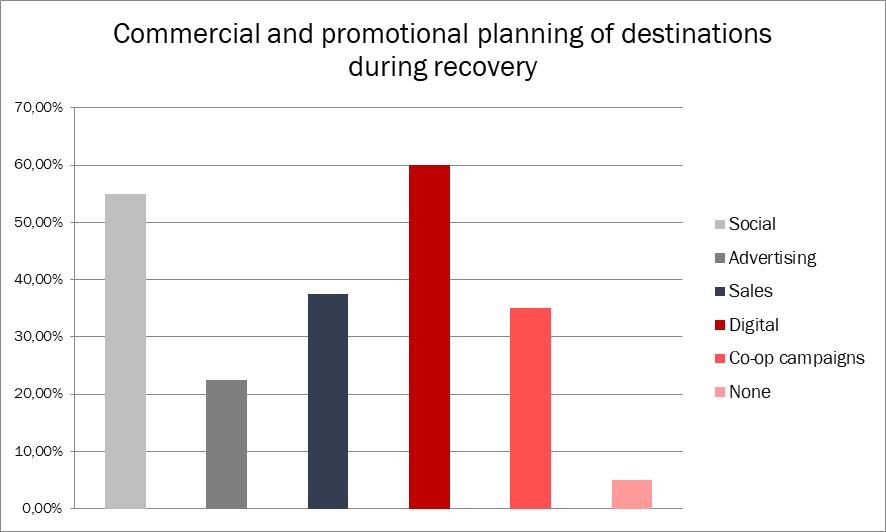
The international distribution coincides with Spain’s forecast of a reduction in income in the third (up to 73%) and fourth (up to 60%) quarters of 2020, and they see their businesses in danger in the medium term if they do not receive aid from local administrations. As in Spain, international tourism distribution companies opted to design new products, readjust their business model, improve customer service and training programs to deal with the effects of the pandemic; and they expect destinations to introduce certifications that will give travellers peace of mind. Furthermore, international and Spanish intermediation also coincide in the changes expected in the business in matters such as the flexibility of cancellation policies, the expansion of communication channels with customers and the diversification of the offer, for which proposals from other suppliers and destinations with which they had not worked previously will be explored.
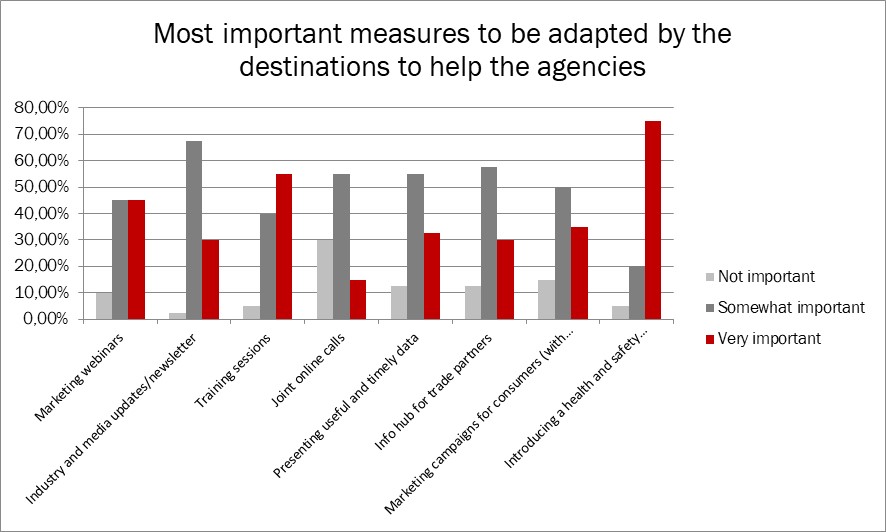
María Sánchez-Grela
MANAGING DIRECTOR


 All the news
All the news  Back to newsroom
Back to newsroom

